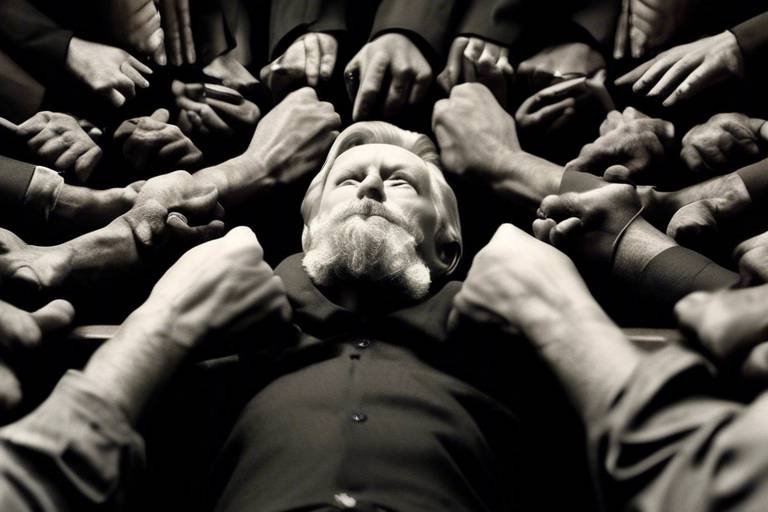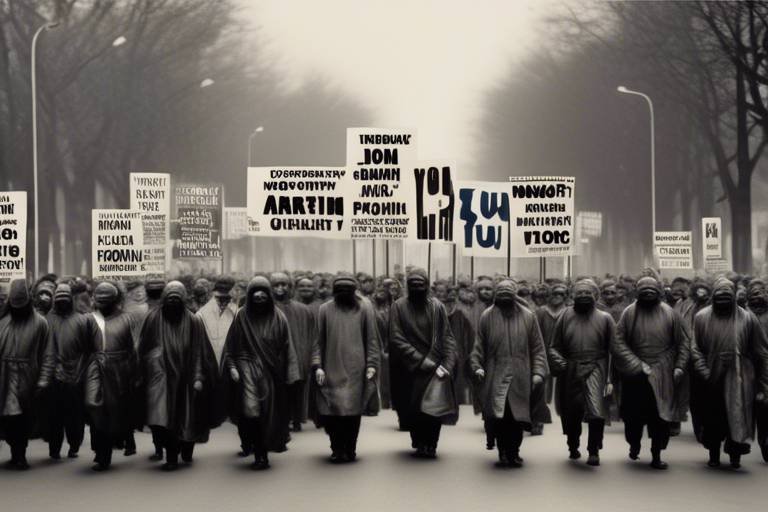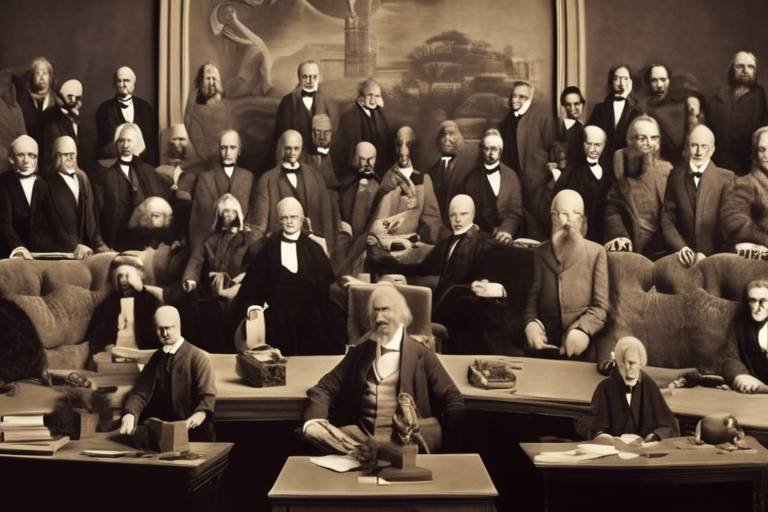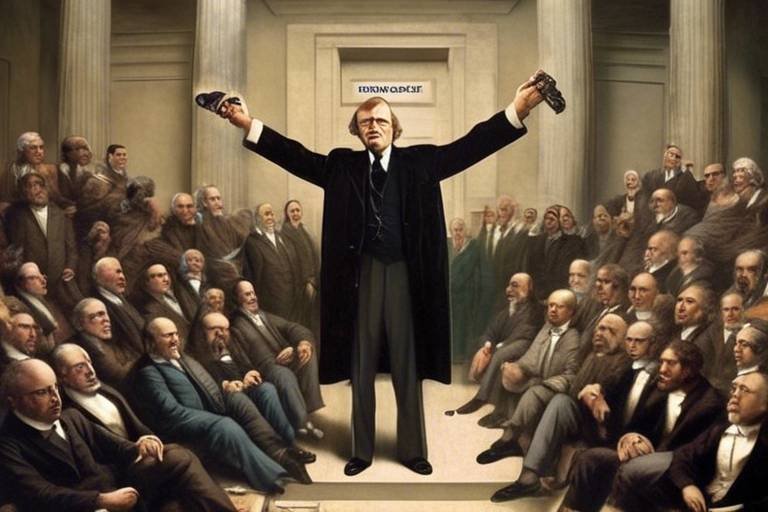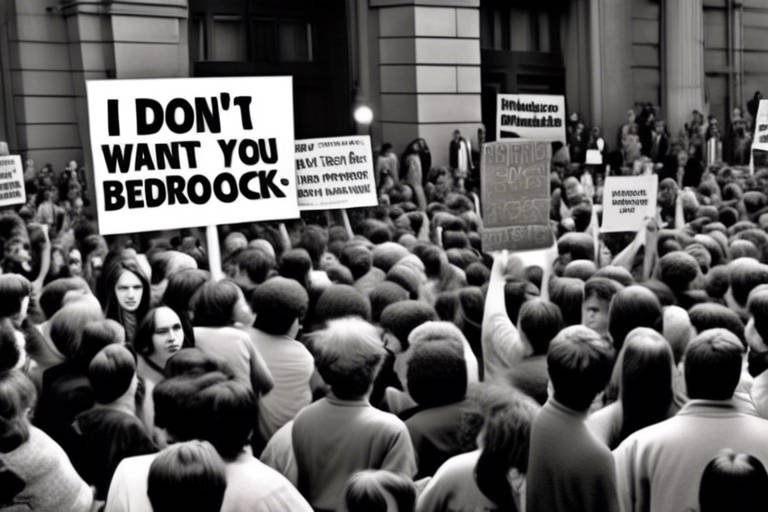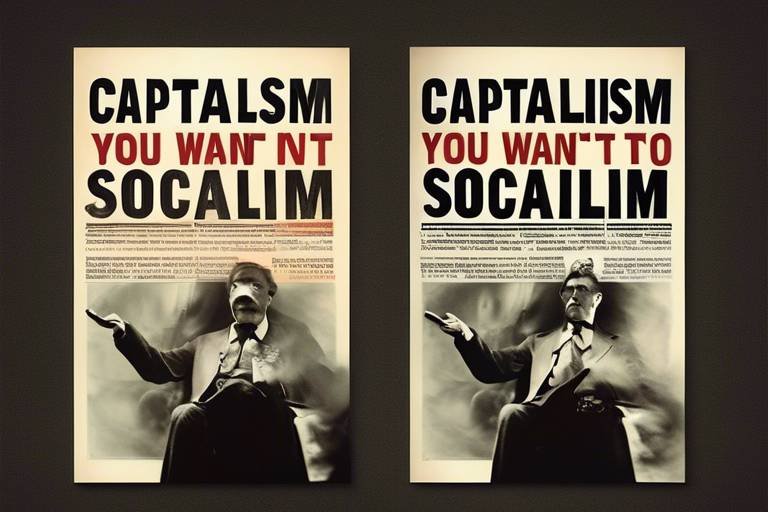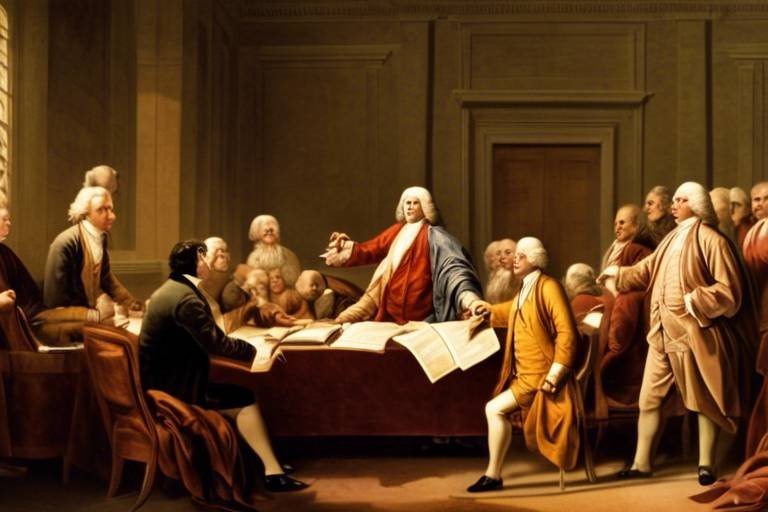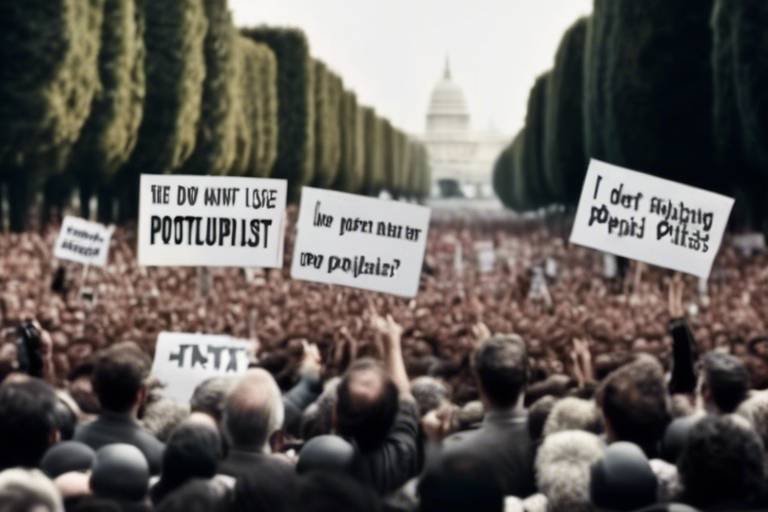Philosophy and Politics - A Study of Power Dynamics
In the grand tapestry of human civilization, the threads of philosophy and politics are intricately woven together, creating a complex pattern that shapes our understanding of power and governance. At first glance, one might see these two domains as distinct; philosophy pondering the abstract questions of existence and morality, while politics deals with the tangible realities of governance and authority. However, a deeper examination reveals that philosophical ideas do not merely influence political structures—they are the very foundation upon which these structures are built. From ancient Greece to modern democracies, the interplay between philosophical thought and political practice has continuously evolved, raising critical questions about the nature of power, justice, and the role of individuals within society.
Consider this: what if the principles that govern our lives are not just the result of political maneuvering, but rather the manifestation of centuries of philosophical inquiry? This article embarks on a journey to explore how philosophical ideas have shaped political ideologies and practices, revealing the dynamic relationship that exists between these two fields. We will delve into the nature of power, investigating its essence through various philosophical lenses, and uncover how key thinkers have contributed to our understanding of governance and authority. By examining the evolution of political philosophy, we can better appreciate the ethical considerations that underpin political actions and policies today.
As we navigate through this exploration, we will encounter influential figures such as Plato, Machiavelli, and John Locke, each of whom has left an indelible mark on political thought. Their ideas not only reflect the historical context in which they were conceived but also resonate with contemporary issues we face in our political landscape. Additionally, we will analyze modern political theories that address pressing societal inequalities, illustrating how philosophical frameworks continue to shape our understanding of justice and equity.
Ultimately, this article aims to illuminate the profound connections between philosophy and politics, encouraging readers to reflect on how these disciplines influence their own lives and the world around them. Are we merely subjects of political power, or are we active participants in shaping the values and principles that govern our societies? By engaging with these questions, we can better understand the role of philosophy in the ongoing quest for justice and a more equitable distribution of power.

The Nature of Power
Understanding the essence of power is crucial in both philosophy and politics. Power is not merely the ability to influence others; it encompasses a complex web of relationships, authority, and control that shapes societies and governs interactions. Philosophers have long debated the definition and sources of power, leading to a rich tapestry of ideas that inform our understanding of political dynamics. From the ancient world to contemporary society, the implications of power are profound, affecting everything from individual rights to global governance.
At its core, power can be seen as the capacity to effect change, whether on a small scale within communities or on a grand scale in international relations. Different philosophical perspectives offer varied interpretations of what power is and where it originates. For instance, some argue that power is derived from force or coercion, while others posit that it stems from consent and legitimacy. This divergence raises intriguing questions: Is power inherently corrupting? Can it be wielded ethically? And how do societal structures influence the distribution of power?
To explore these questions, we can categorize power into several key dimensions:
- Coercive Power: This type of power relies on the ability to enforce compliance through threats or force. It’s often seen in authoritarian regimes where dissent is suppressed.
- Legitimate Power: Rooted in established laws and norms, legitimate power is recognized by society. Democratic governments, for instance, derive their power from the consent of the governed.
- Expert Power: This form of power arises from an individual’s skills or expertise. In many cases, leaders who possess specialized knowledge can influence decisions and policies.
- Referent Power: This power comes from the personal traits or charisma of an individual. Influential figures, such as activists or thought leaders, often inspire others to follow their vision.
These dimensions of power highlight how it can be both a tool for oppression and a means of liberation. The philosophical inquiry into power dynamics reveals that while some may use power to dominate, others harness it to uplift and empower marginalized voices. This duality invites us to consider how power is exercised and the ethical implications of its use in political contexts.
Moreover, examining power through a historical lens allows us to see its evolution. From the ancient city-states of Greece, where philosophers like Plato envisioned an ideal society led by wise rulers, to the pragmatic approaches of thinkers like Machiavelli, who emphasized the often ruthless nature of political power, the discourse surrounding power has continually adapted to the changing political landscape.
In contemporary society, the nature of power is further complicated by globalization and technology. The rise of the internet and social media has transformed how power is distributed and exercised. Information has become a critical asset, with those who control it wielding significant influence over public opinion and political outcomes. This shift raises important questions about accountability and transparency in governance.
In conclusion, the nature of power is a multifaceted concept that intertwines with both philosophical inquiry and political practice. Understanding its nuances is essential for anyone seeking to navigate the complexities of modern governance. As we continue to explore the relationship between philosophy and politics, we must remain vigilant about how power is used and who it serves, ensuring that it is a force for good rather than a means of oppression.

Political Philosophy
Political philosophy is a fascinating field that dives deep into the fundamental questions surrounding governance, justice, and rights. It’s like peeling an onion—each layer reveals complex ideas and theories that have shaped how societies function. Think about it: every time a law is passed or a political movement arises, there’s a philosophical underpinning guiding those decisions. This section explores the pivotal thinkers and their contributions to political thought, which have significantly influenced modern political ideologies and practices.
At its core, political philosophy grapples with questions such as: What is justice? What rights should individuals possess? How should power be distributed? These inquiries are not just academic; they resonate in our daily lives and influence the very fabric of our societies. Political philosophers have sought to provide answers, often leading to the development of various schools of thought. For instance, consider the contrast between liberalism, which champions individual freedoms and rights, and socialism, which advocates for collective ownership and equality.
Throughout history, several key figures have emerged as giants in the realm of political philosophy. Their ideas have not only shaped their contemporary societies but have also left a lasting legacy that continues to influence current political discourse. For example, the works of thinkers like John Stuart Mill, who emphasized the importance of individual liberty, and Karl Marx, who critiqued capitalism and proposed a revolutionary approach to class struggle, illustrate the breadth of thought within political philosophy.
To better understand the landscape of political philosophy, it’s helpful to categorize these influential thinkers into distinct schools of thought. Here’s a quick overview:
| Philosopher | Key Ideas | Impact on Politics |
|---|---|---|
| Plato | Idealism, Philosopher-Kings | Influenced concepts of governance and justice |
| Machiavelli | Realism, Power Dynamics | Shifted focus to pragmatic statecraft |
| John Locke | Natural Rights, Social Contract | Foundation for liberal democracy |
This table highlights just a few of the thinkers who have shaped political philosophy. Their ideas often intersect and diverge, creating a rich tapestry of thought that continues to evolve. For instance, while Plato envisioned a society governed by philosopher-kings who would rule justly, Machiavelli took a starkly different approach, arguing that the ends often justify the means in political leadership. This clash of ideals raises essential questions about morality and effectiveness in governance.
Moreover, political philosophy is not just a relic of the past; it is alive and well in contemporary society. The debates surrounding issues such as climate change, social justice, and human rights are deeply rooted in philosophical discourse. As we navigate these complex issues, the principles derived from political philosophy provide a framework for understanding and addressing the challenges we face today.
In conclusion, political philosophy serves as a crucial lens through which we can examine the structures of power and authority in our world. By studying the thoughts of influential philosophers, we gain insights into the nature of justice, rights, and governance. Whether you lean towards liberalism, socialism, or another ideology, the foundational ideas of political philosophy offer valuable perspectives that can inform our understanding of the political landscape.

Influential Thinkers
The realm of political philosophy has been profoundly shaped by a handful of whose ideas continue to resonate in today's political landscape. These philosophers, through their unique perspectives and groundbreaking theories, have laid the groundwork for how we understand governance, authority, and the role of the individual in society. Among them, Plato, Machiavelli, and John Locke stand out as titans whose contributions have significantly influenced political thought and practice.
Let’s start with Plato, who envisioned a society governed by philosopher-kings. His idea of the “ideal state” is not merely a theoretical construct but a profound commentary on the nature of justice and governance. Plato believed that only those who truly understand the essence of justice should hold power. Imagine a world where leaders are not just politicians but wise rulers who prioritize the common good over personal gain. His work, particularly in "The Republic," challenges us to consider the qualifications of those in power and the moral implications of their decisions.
On the other hand, we have Machiavelli, whose pragmatic approach to politics starkly contrasts with Plato's idealism. In "The Prince," Machiavelli famously asserts that the ends often justify the means, presenting a more realistic view of political power. His insights into statecraft and human nature reveal a world where political leaders must sometimes make difficult choices to maintain stability and control. This raises a critical question: should morality take a backseat to political necessity? Machiavelli’s ideas force us to grapple with the complexities of leadership and the sometimes harsh realities of governance.
Then there's John Locke, whose theories on natural rights and government by consent laid the foundation for modern democracy. Locke argued that individuals possess inherent rights to life, liberty, and property, and that the primary role of government is to protect these rights. His social contract theory revolutionized political thought by emphasizing the importance of the governed’s consent. Imagine a society where the government is accountable to its citizens, a radical idea in Locke's time that continues to inspire democratic movements worldwide.
These thinkers not only shaped their own eras but also left an indelible mark on future generations. Their ideas can be summarized in the following table, illustrating the core contributions of each philosopher:
| Thinker | Key Contribution | Impact on Politics |
|---|---|---|
| Plato | Philosopher-kings and the ideal state | Influenced concepts of governance and justice |
| Machiavelli | Realism in politics; the ends justify the means | Shaped modern political strategies and statecraft |
| John Locke | Natural rights and government by consent | Foundation for modern democracy and individual rights |
In conclusion, the ideas of Plato, Machiavelli, and Locke continue to influence the way we think about power and governance today. Their philosophical legacies challenge us to consider the ethical dimensions of political authority and the responsibilities of those in power. As we navigate the complexities of contemporary politics, reflecting on the insights of these thinkers can provide invaluable guidance in our quest for a just and equitable society.
- Who is considered the father of political philosophy? Plato is often regarded as one of the earliest political philosophers due to his foundational ideas on governance and justice.
- What is Machiavelli's most famous work? "The Prince" is Machiavelli's most renowned work, where he discusses the pragmatic aspects of political leadership.
- How did John Locke influence modern democracy? Locke's theories on natural rights and government by consent laid the groundwork for the principles of modern democratic societies.

Plato's Ideal State
Plato's vision of an ideal state is not just a political theory; it's a profound philosophical inquiry into the nature of justice and governance. In his seminal work, The Republic, Plato lays out a blueprint for a society governed by wisdom and virtue, where rulers are philosopher-kings. Can you imagine a world where those in power are not only knowledgeable but also morally upright? This concept challenges the very foundation of how we view leadership and authority today.
At the heart of Plato's ideal state lies the belief that the just society can only be achieved when the rulers possess the highest form of knowledge—the knowledge of the Good. He argues that only those who understand the essence of justice and the greater good should be entrusted with power. This leads us to ponder: should political leaders be selected based on their wisdom and ethical standards rather than their popularity or wealth? In Plato's view, the answer is a resounding yes.
Plato categorizes society into three distinct classes: the rulers, the auxiliaries (warriors), and the producers (farmers, artisans, etc.). Each class has its own role, contributing to the harmony and stability of the state. The rulers, equipped with philosophical knowledge, govern with wisdom. The auxiliaries protect the state and uphold its laws, while the producers ensure that the society's material needs are met. This division of labor emphasizes the importance of each role in maintaining a balanced and just society.
Furthermore, Plato's ideal state is characterized by the concept of the noble lie, a myth or untruth that serves a beneficial social function. This idea raises intriguing questions about the ethics of governance: Is it justifiable for leaders to deceive the populace for the greater good? Plato believed that such lies could foster unity and social cohesion, but this notion also invites skepticism regarding the manipulation of truth in politics. How far should leaders go to protect their citizens?
In contemporary governance, Plato's ideas resonate through discussions about the qualifications of leaders and the moral responsibilities that come with power. His philosophy urges us to reflect on the qualities we value in our political figures. Are we prioritizing wisdom and virtue, or are we swayed by charisma and rhetoric? As we navigate the complexities of modern politics, Plato’s vision serves as a reminder of the ideals we should strive for, even if they seem utopian.
Ultimately, Plato's ideal state challenges us to consider the relationship between knowledge, ethics, and power. It invites a critical examination of our political systems and the principles that guide them. In a world where political ideologies often clash, Plato’s emphasis on the philosopher-king remains a thought-provoking concept, urging us to seek leaders who embody wisdom and justice.
- What is Plato's ideal state? Plato's ideal state is a philosophical concept where society is governed by philosopher-kings who possess wisdom and knowledge of the Good.
- How does Plato categorize society? Plato divides society into three classes: rulers, auxiliaries, and producers, each with distinct roles that contribute to societal harmony.
- What is the noble lie? The noble lie is a myth that leaders may use to promote social unity and cohesion, raising ethical questions about the manipulation of truth in governance.
- Why is Plato's philosophy relevant today? Plato's emphasis on wisdom and virtue in leadership continues to resonate in contemporary discussions about the qualities we seek in political figures.

Machiavelli's Realism
Machiavelli's approach to politics is often described as a breath of fresh air in a world filled with idealism and lofty principles. Instead of focusing on what ought to be, he dives into the murky waters of what is. His seminal work, The Prince, serves as a guide for rulers, emphasizing the importance of pragmatism over morality. Machiavelli famously asserted that the ends often justify the means, a phrase that has sparked countless debates and discussions in political circles. But what does this really mean?
To understand Machiavelli's realism, we must first recognize the context in which he wrote. The political landscape of Renaissance Italy was chaotic, filled with power struggles and shifting alliances. In such an environment, idealistic notions of governance were not just impractical; they were dangerous. Machiavelli argued that a successful ruler must be willing to adapt, manipulate, and sometimes deceive to maintain power and stability.
One of the key concepts in Machiavelli's thought is the distinction between virtù and fortuna. Virtù refers to a ruler's ability to shape their destiny through skill, wisdom, and strength, while fortuna represents the unpredictable nature of luck and chance. A wise leader must understand how to navigate these two forces, leveraging their virtù to influence fortuna. This interplay is crucial for anyone seeking to establish or maintain authority in a tumultuous political landscape.
Moreover, Machiavelli's realism challenges the notion of ethical governance. He posits that moral considerations often hinder effective leadership. For instance, a ruler might need to engage in deceitful practices to protect the state or ensure the greater good. This idea raises a critical question: can we separate ethics from politics? Machiavelli would argue that in many cases, we cannot afford to be bound by moral constraints when the survival of the state is at stake.
In modern political strategies, Machiavelli's insights remain remarkably relevant. Leaders today often find themselves in situations where tough decisions must be made, balancing ethical considerations with the need for power and control. His ideas resonate in various political contexts, from corporate governance to international relations, where the stakes are high, and the consequences of failure can be dire.
To illustrate Machiavelli's impact on political thought, consider the following table that outlines some of his key principles and their modern applications:
| Principle | Description | Modern Application |
|---|---|---|
| Ends Justify the Means | Actions are justified if they lead to a successful outcome. | Corporate strategies that prioritize profit over ethical considerations. |
| Virtù and Fortuna | The balance of skill and luck in leadership. | Political leaders adapting to changing circumstances. |
| Realpolitik | A pragmatic approach to politics, focusing on practical results. | International relations strategies that prioritize national interests. |
In conclusion, Machiavelli's realism serves as a stark reminder that politics is not a realm governed solely by ideals but by the harsh realities of human nature and power dynamics. His work continues to provoke thought, encouraging leaders and thinkers alike to grapple with the complexities of governance. Are we prepared to embrace the uncomfortable truths that Machiavelli presents? Or will we continue to cling to the comforting illusions of idealism? The answers to these questions may very well shape the future of political thought and practice.
- What is Machiavelli's most famous work? Machiavelli's most famous work is The Prince, which outlines his views on political power and leadership.
- What does 'the ends justify the means' mean? This phrase suggests that actions are permissible if they lead to a desirable outcome, often associated with Machiavelli's pragmatic approach to politics.
- How does Machiavelli's realism differ from idealism? Realism focuses on practical and often harsh realities of political power, while idealism emphasizes moral values and what should be.

Modern Political Theories
Modern political theories have significantly shaped our understanding of power distribution and governance in contemporary society. As we navigate through the complexities of the 21st century, it becomes clear that these theories are not just academic concepts; they are frameworks that influence real-world politics and the lives of individuals. Among the most prominent theories are liberalism, socialism, and feminism, each offering unique perspectives on how power should be structured and exercised.
Liberalism, for instance, champions the ideas of individual freedom and limited government intervention. It posits that the role of the state is primarily to protect the rights of individuals, allowing them to pursue their own interests. This theory has been pivotal in shaping democratic institutions and policies that emphasize human rights. In essence, liberalism advocates for a political landscape where the government serves the people, rather than the other way around.
On the other hand, socialism presents a contrasting viewpoint. It argues for collective ownership and the redistribution of wealth to address societal inequalities. This theory emphasizes the need for a system where the means of production are owned by the community, ensuring that everyone has access to basic necessities and opportunities. Socialism challenges the capitalist framework by insisting that economic disparities can lead to significant social injustices, thereby advocating for a more equitable society.
Meanwhile, feminism expands the discourse by highlighting the importance of gender equality in political theory. Feminist political thought critiques traditional power structures that have historically marginalized women and other gender minorities. It calls for a re-examination of political practices and policies to ensure that they are inclusive and representative of all genders. By addressing the systemic barriers faced by women, feminism seeks to create a more just and equitable political landscape.
These modern political theories are not mutually exclusive; they often intersect and influence one another. For instance, many contemporary liberal movements have adopted feminist principles to promote gender equality, while some socialist frameworks incorporate liberal ideas about individual rights. The blending of these theories creates a rich tapestry of political thought that encourages ongoing dialogue and adaptation in response to societal changes.
To illustrate the differences and intersections among these theories, the following table summarizes their core principles:
| Theory | Core Principles | Key Focus |
|---|---|---|
| Liberalism | Individual freedom, limited government | Rights and liberties of individuals |
| Socialism | Collective ownership, wealth redistribution | Economic equity and social justice |
| Feminism | Gender equality, inclusivity | Empowerment of marginalized genders |
In conclusion, modern political theories provide essential insights into the dynamics of power and governance. They challenge us to think critically about the structures that govern our lives and inspire movements aimed at fostering equality and justice. As society evolves, these theories will continue to play a crucial role in shaping political discourse and action, reminding us that the pursuit of a fair and just society is an ongoing journey.
- What is the main goal of liberalism? Liberalism aims to protect individual rights and freedoms while promoting limited government intervention.
- How does socialism address economic inequality? Socialism advocates for collective ownership and wealth redistribution to ensure everyone has access to basic needs.
- What role does feminism play in modern political theory? Feminism emphasizes gender equality and seeks to challenge traditional power structures that marginalize women.

The Role of Ethics in Politics
Ethics, often viewed as the backbone of human interaction, plays a vital role in shaping political decisions and policies. Imagine a ship navigating through turbulent waters; without a compass, it risks drifting aimlessly. Similarly, in the realm of politics, ethical considerations serve as that compass, guiding leaders and institutions toward decisions that not only reflect their values but also resonate with the public's sense of justice and morality. The intertwining of moral philosophy and political action raises crucial questions: What is the right course of action? How do we balance the needs of the many against the rights of the few? These questions are not merely academic; they have real-world implications that affect millions.
At its core, political ethics examines the principles that govern the behavior of individuals and institutions in the political sphere. It asks us to reflect on the moral responsibilities of those in power. Are they acting in the best interest of their constituents? Are they prioritizing the common good over personal gain? As we delve deeper into this subject, we uncover various ethical frameworks that influence political thought and action.
One such framework is utilitarianism, which posits that the best action is the one that maximizes overall happiness. This principle is often applied in political decision-making, where leaders weigh the potential benefits and harms of their policies. For instance, consider a government deciding on healthcare reform. A utilitarian approach would involve calculating the overall happiness generated by the reform—such as improved health outcomes and reduced costs—versus any potential downsides, like increased taxes. On the other hand, we have deontological ethics, which emphasizes the importance of duty and adherence to rules. This perspective might argue against certain policies even if they produce favorable outcomes, insisting that some actions are inherently wrong, regardless of their consequences.
As we explore these ethical frameworks, it becomes evident that they are not mutually exclusive. In fact, political leaders often find themselves navigating between these two paradigms, striving to create policies that are both effective and morally sound. The challenge lies in finding a balance that respects individual rights while promoting the collective good.
Moreover, the pursuit of social justice and equity in political philosophy raises essential questions about fairness and representation. Politicians are frequently called upon to address societal inequalities, and the ethical considerations surrounding these issues can be complex. For example, when discussing affirmative action policies, one must consider both the historical injustices faced by marginalized groups and the potential backlash from those who feel unfairly treated by such measures. Here, ethical frameworks become crucial in guiding discussions and policies aimed at achieving societal equity.
In conclusion, the role of ethics in politics cannot be overstated. It shapes the decisions of leaders, influences public policy, and ultimately affects the lives of citizens. As we continue to grapple with pressing social issues, the importance of ethical considerations in political discourse will only grow. The challenge remains: how do we ensure that our political systems reflect our ethical values while navigating the complexities of human society?
- What is the importance of ethics in political decision-making? Ethics provides a framework for evaluating actions and policies, ensuring that leaders act in the best interest of their constituents.
- How do utilitarianism and deontology differ in political philosophy? Utilitarianism focuses on the outcomes of actions, aiming to maximize overall happiness, while deontology emphasizes moral duties and rules, regardless of consequences.
- Can ethical considerations conflict with political expediency? Yes, often ethical decisions may require leaders to prioritize moral values over political gain, leading to potential conflicts.

Utilitarianism vs. Deontology
When it comes to making decisions in politics, the philosophical debate between utilitarianism and deontology is as vibrant as ever. At its core, utilitarianism is all about the outcomes; it posits that the rightness or wrongness of an action is determined by its consequences. In other words, if an action produces the greatest happiness for the greatest number of people, then it is deemed morally right. Think of it like a scale: if the benefits outweigh the harms, then you’re on the right side of morality. This perspective can be incredibly appealing in political contexts where leaders must weigh the potential impacts of their decisions on large populations.
On the flip side, we have deontology, which focuses on the inherent morality of actions themselves, regardless of the outcomes. This approach, championed by philosophers like Immanuel Kant, argues that certain actions are categorically right or wrong based on duty and rules. For instance, telling the truth is considered a moral obligation, even if lying could lead to better overall consequences. This can create a fascinating tension in political decision-making, as leaders grapple with whether to adhere to ethical principles or to prioritize the greater good.
To illustrate the differences between these two ethical frameworks, let’s consider a hypothetical scenario: imagine a government official must decide whether to implement a policy that would lead to significant economic growth but at the cost of environmental degradation. A utilitarian might argue in favor of the policy, citing the overall happiness and prosperity it would bring to society. Conversely, a deontologist would likely oppose it, emphasizing the moral duty to protect the environment, regardless of the economic benefits.
The implications of these ethical theories extend beyond individual decisions; they shape political ideologies and influence public policy. For example, policies that lean towards utilitarianism might prioritize economic growth and efficiency, while those influenced by deontological ethics might focus on human rights and environmental protections. This creates a rich tapestry of political thought, where different ethical considerations collide, often leading to heated debates and discussions.
In practice, many political leaders find themselves navigating a complex landscape that requires balancing these two perspectives. They might adopt a utilitarian approach in some situations, while insisting on deontological principles in others. This blend can lead to a more nuanced understanding of governance, where the needs of the many are weighed against the rights of the individual. Ultimately, the interplay between utilitarianism and deontology not only informs political decisions but also reflects broader societal values, making it a crucial topic for anyone interested in the philosophy of politics.
- What is utilitarianism? Utilitarianism is an ethical theory that suggests that the best action is the one that maximizes overall happiness or utility.
- What is deontology? Deontology is an ethical theory that emphasizes the importance of following moral rules or duties, regardless of the consequences.
- How do these theories apply to politics? In politics, utilitarianism may guide policies that aim for the greatest good for the majority, while deontology may advocate for the protection of individual rights and moral duties.
- Can a politician use both theories? Yes, many politicians navigate between utilitarian and deontological principles, applying them based on the context of their decisions.

Social Justice and Equity
When we delve into the concepts of social justice and equity, we're essentially exploring the very fabric that holds our societies together. Imagine a tapestry woven from the threads of fairness, rights, and opportunities—this is the essence of social justice. It's about ensuring that every individual, regardless of their background, has access to the same opportunities and resources. But what does this really mean in practice? How do we translate these lofty ideals into tangible policies that affect real lives?
At its core, social justice is about addressing the inequalities that exist in our communities. This can include economic disparities, racial injustices, and gender inequities, among others. The pursuit of equity involves recognizing that different individuals and groups may need different resources and support to achieve similar outcomes. It's not just about treating everyone the same; it's about acknowledging and addressing the unique challenges faced by marginalized communities.
For instance, consider the differences in educational opportunities available to children from affluent neighborhoods versus those in underprivileged areas. A child in a wealthy district might have access to advanced placement courses, extracurricular activities, and well-funded schools, while their counterpart in a low-income area may struggle with outdated textbooks and overcrowded classrooms. This disparity highlights the need for policies that not only aim for equality but also actively work to level the playing field.
To illustrate the impact of social justice initiatives, we can look at various policies implemented across the globe. Here are some examples:
- Affirmative Action: Programs designed to promote the inclusion of underrepresented groups in education and employment.
- Universal Basic Income: A proposed economic policy that provides all citizens with a regular, unconditional sum of money to ensure a basic standard of living.
- Healthcare Access Initiatives: Policies aimed at providing affordable healthcare to low-income populations, ensuring that health disparities are addressed.
These initiatives are just the tip of the iceberg. The conversation around social justice and equity is ongoing, evolving with the times and the needs of society. As we continue to grapple with issues such as systemic racism, gender inequality, and economic disparity, it's crucial that we remain vigilant and proactive in advocating for change. The challenge lies not only in recognizing these injustices but also in mobilizing the necessary resources and political will to address them.
Furthermore, the role of ethical frameworks in shaping policies aimed at achieving social justice cannot be understated. Philosophers have long debated the principles of fairness and equity, with different schools of thought offering varied approaches to these complex issues. For example, utilitarianism emphasizes the greatest good for the greatest number, while deontological ethics focuses on the morality of actions themselves, regardless of their outcomes. Understanding these perspectives can help us navigate the intricate landscape of political decision-making.
In conclusion, the pursuit of social justice and equity is not merely an academic exercise; it is a vital component of a functioning democracy. It requires a commitment from all sectors of society—government, businesses, and individuals alike—to ensure that everyone has a fair shot at success. As we move forward, let us remember that the quest for justice is a collective journey, one that calls for empathy, understanding, and action.
- What is social justice? Social justice refers to the fair distribution of resources, opportunities, and privileges within a society, ensuring that all individuals have equal access to rights and opportunities.
- How does equity differ from equality? While equality emphasizes treating everyone the same, equity recognizes that different individuals may require different resources and support to achieve similar outcomes.
- Why is social justice important? Social justice is crucial for creating a fair and equitable society where all individuals can thrive, regardless of their background or circumstances.
- What are some examples of social justice initiatives? Examples include affirmative action, universal basic income, and healthcare access initiatives aimed at reducing disparities in society.
Frequently Asked Questions
- What is the relationship between philosophy and politics?
The relationship between philosophy and politics is deeply intertwined. Philosophy provides the foundational ideas that shape political structures and power dynamics. It helps us understand concepts like justice, governance, and rights, which are crucial for creating effective political systems.
- How does the nature of power influence society?
The nature of power influences society by determining how resources are distributed, how laws are made, and how individuals interact within a community. Different philosophical perspectives on power, such as its sources and implications, can lead to varied societal outcomes, impacting everything from individual freedoms to collective responsibilities.
- Who are some key thinkers in political philosophy?
Key thinkers in political philosophy include Plato, Machiavelli, and John Locke. Each of these philosophers has contributed significantly to our understanding of governance and authority. For instance, Plato's idea of philosopher-kings highlights the importance of wisdom in leadership, while Machiavelli's realism offers a more pragmatic view of political power.
- What is Plato's ideal state?
Plato's ideal state is a vision where philosopher-kings govern, emphasizing wisdom and justice. He believed that rulers should possess deep knowledge and understanding of the good to create a harmonious society. This concept raises questions about the qualifications necessary for effective governance in today’s political landscape.
- How does Machiavelli's realism differ from idealism?
Machiavelli's realism differs from idealism by focusing on the practical aspects of politics rather than lofty ideals. He argued that the ends often justify the means, which challenges the notion that moral considerations should always guide political actions. This perspective is particularly relevant in contemporary political strategies.
- What are modern political theories?
Modern political theories, including liberalism, socialism, and feminism, provide diverse perspectives on how power should be distributed in society. Each theory addresses societal inequalities and advocates for different approaches to governance, reflecting the complexities of contemporary political discourse.
- What role do ethics play in politics?
Ethics play a vital role in politics by influencing decision-making and policy formulation. Political leaders often grapple with moral dilemmas, and their choices can significantly impact society. The intersection of moral philosophy and political action raises essential questions about what is right and just in governance.
- What is the difference between utilitarianism and deontology?
Utilitarianism focuses on the outcomes of actions, aiming for the greatest good for the greatest number, while deontology emphasizes the morality of actions themselves, regardless of the consequences. This debate significantly impacts political decision-making, as leaders must choose which ethical framework to apply in their policies.
- How does the pursuit of social justice influence political philosophy?
The pursuit of social justice influences political philosophy by raising critical questions about fairness, representation, and equity. Ethical frameworks guide policies aimed at achieving societal equity, ensuring that all individuals have access to opportunities and resources, which is essential for a just society.

